News
Effective way to treat coliform in domestic water today
There are many ways to treat coliform in domestic wastewater. However, which method is effective and ensures user safety? This is an issue that attracts everyone’s attention. Because treating coliform is not a simple job. If not chosen correctly, water source quality can be unsafe and affect human health. Our article below will share with you ways to treat microbially contaminated water:
How to treat coliform in domestic wastewater
Treatment with sunlight
Sunlight contains ultraviolet rays. Therefore, coliform treatment can be done naturally, simply and easily. Here’s how:
Put water in clear bottles, jars, and bags so the sunlight can shine in for long periods of time. Existing ultraviolet rays will destroy all coliform bacteria in the water.
Treatment with sunlight
Although this method is considered to be able to remove coliform, it is not very effective and consumes a lot of time. Therefore, it is possible that this bacteria still exists in the water. At the same time, the processing volume is not high so it cannot meet the needs of the majority of people.
Treat coliforms with chlorine
Chlorine is one of the disinfectant chemicals commonly used in the treatment of domestic water and swimming pool water.
Chlorine chemicals provide high treatment efficiency and can kill all coliforms in water. However, it is necessary to pay attention to the concentration and dosage according to the instructions for use.
Chlorine treats coliforms
According to medical experts, the standard concentration of chlorine gas in water disinfection ranges from 0.3 – 0.5 mg/liter of water.
If chlorine is used in low doses, it will not be effective in killing bacteria completely. If the dosage is too high, it will lead to excess chlorine, chlorine poisoning causing health effects such as: Immunodeficiency, liver failure, kidney failure, dry skin, dry hair, peeling skin…
How to treat coliform with RO water purifier
RO membranes are also capable of treating coliforms in domestic water. This device uses advanced RO reverse osmosis filtration technology combined with a micro-sized filter system.
Treat coliform with RO water purifier
RO water purifiers are capable of destroying up to 99.99% of impurities, toxic substances, metal ions, pesticides, mud and microorganisms in water, including coliform.
RO water purifiers provide high water treatment efficiency, safety, and cost savings. Therefore, this is a device that many households and offices choose to use.
The treated water source meets direct drinking water standards QCVN 6-1:2010/BYT – National Technical Regulations and drinking water quality standards QCVN 01:2009/BYT.
Use ultraviolet rays
Ultraviolet rays have extremely high bactericidal ability. Therefore, to remove coliform, you can use ultraviolet light.
Use ultraviolet rays
UV ultraviolet light can kill bacteria in water, including coliform. During application, attention should be paid to the following issues:
The lighting time is long enough for microorganisms to be completely destroyed.
To effectively treat coliform in domestic water using ultraviolet light, it is necessary to ensure water clarity. The more cloudy the water, the less effective the lamp becomes.
This method is suitable for domestic water treatment systems with large capacity.
Use a water filtration system
Domestic water filtration systems are also considered an effective and easy-to-apply coliform treatment method today.
Use a water filtration system
In a system there will be many different filter layers. For example, pre-filter, carbon filter, reverse osmosis filter, ultraviolet light. Thanks to that, all pollutants in the water, especially coliform bacteria, will be destroyed.
Benefits of coliform treatment
Treating coliform in domestic water has many benefits, including:
- Health protection
Coliform is a type of bacteria that can cause gastrointestinal infections, such as diarrhea and enteritis. Treating coliform in water helps reduce the risk of diseases related to this bacteria. - Ensure water quality
Treating coliform water helps ensure that water is clean and safe to use for domestic purposes, such as drinking, cooking and bathing. - Reduce costs
Water treated for coliform is of better quality, helping to reduce costs for equipment replacement and other costs associated with using contaminated water. - Environmental protection
Treating coliform in water helps reduce environmental pollution caused by the discharge of polluted water, helping to protect water sources and the natural environment.
Therefore, treating coliform in domestic water is very important to ensure community health and protect the environment.


